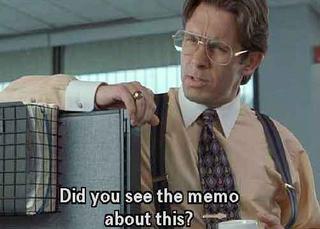8.11.2005
Fantasy Football: Bane or Boon of the Workplace?
 There is growing concern in corporate America that fantasy football is a cancer in the workplace. According to some estimates, the cost of fantasy football to American businesses exceeds the very considerable revenue generated by the hobby. One of the most widely cited estimates comes from the firm of Challenger, Gray, and Christmas, Inc., whose CEO speculates that fantasy football costs the nation’s employers $36,000,000 in lost productivity. John A. Challenger points out that lost time isn’t only a product of workers surfing fantasy sites for the latest updates concerning their players, but of office socialization: “If it is not the Internet, it could be 10 minutes of chatting around the watercooler with other league aficionados. For every 10 minutes an employee chats at the watercooler about the tournament, the company is basically paying for unproductive worktime.”
There is growing concern in corporate America that fantasy football is a cancer in the workplace. According to some estimates, the cost of fantasy football to American businesses exceeds the very considerable revenue generated by the hobby. One of the most widely cited estimates comes from the firm of Challenger, Gray, and Christmas, Inc., whose CEO speculates that fantasy football costs the nation’s employers $36,000,000 in lost productivity. John A. Challenger points out that lost time isn’t only a product of workers surfing fantasy sites for the latest updates concerning their players, but of office socialization: “If it is not the Internet, it could be 10 minutes of chatting around the watercooler with other league aficionados. For every 10 minutes an employee chats at the watercooler about the tournament, the company is basically paying for unproductive worktime.”Variously termed “cyberslacking” or “cyberloafing” by workplace efficiency experts, the unauthorized use of Internet access by employees at work supposedly costs companies $50,000,000,000 or more in lost productivity each year. I’m no efficiency expert, so I have no idea how that number was arrived at. I dare to suggest, however, that if all employees throughout the world with Internet access stopped cyberslacking from August 1, 2005 through August 1, 2006, it would be insane for us to expect fifty billion dollars in goods and services simply to manifest themselves as a direct result.
Cyberslacking happens, I suppose, because it can. If you have to hire a company such as Stellar Internet Monitoring to find out which of your employees are tinkering with their fantasy football lineups on company time, that is probably because the ones who are spending time on fantasy football at work are getting their work done just as efficiently as (perhaps even more efficiently than) those who aren’t.
|| doug, 12:01
